| Listing 1 - 10 of 12 | << page >> |
Sort by
|

ISBN: 0415248019 9780415248013 0203994787 9780203994788 9786610113880 6610113882 9780415248020 0415248027 1134537786 128011388X 9781134537730 9781134537778 9781134537785 1134537778 Year: 2002 Volume: 4 Publisher: London Routledge
Abstract | Keywords | Export | Availability | Bookmark
 Loading...
Loading...Choose an application
- Reference Manager
- EndNote
- RefWorks (Direct export to RefWorks)
Examines Hume's reflections on the nature of identity from a range of writings including his famous Treatise on Human Nature. Provides a critical exploration of his thinking.
Hume, David --- Cogito --- Ik (Filosofie) --- Moi (Philosophie) --- Self (Philosophy) --- Hume, David, --- Philosophy --- Personne (philosophie) --- Soi (philosophie)
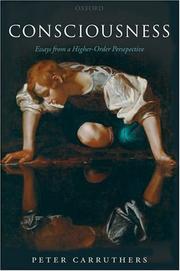
ISBN: 0199277354 0199277362 9780199277360 9780199277353 0191602590 9786611198480 1435623428 0191535044 128119848X 9780191535048 9780191602597 9781435623422 6611198482 Year: 2005 Publisher: Oxford Clarendon
Abstract | Keywords | Export | Availability | Bookmark
 Loading...
Loading...Choose an application
- Reference Manager
- EndNote
- RefWorks (Direct export to RefWorks)
Presenting an original theory of consciousness, Peter Carruthers provides controversial claims about the similarities and differences between human and animal minds.
Bewustzijn --- Cogito --- Conscience (Psychophysiologie et philosophie) --- Consciousness --- Philosophical anthropology --- Philosophy of science --- Apperception --- Mind and body --- Perception --- Philosophy --- Psychology --- Spirit --- Self --- Consciousness.
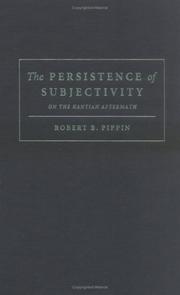
ISBN: 9780521848589 052184858X 9780521613040 0521613043 9780511614637 1107153050 051118204X 0511115814 0511299966 0511614632 1280416181 0511199260 0511115261 9780511115813 9780511115264 Year: 2005 Publisher: Cambridge Cambridge University Press
Abstract | Keywords | Export | Availability | Bookmark
 Loading...
Loading...Choose an application
- Reference Manager
- EndNote
- RefWorks (Direct export to RefWorks)
The Persistence of Subjectivity examines several approaches to, and critiques of, the core notion in the self-understanding and legitimation of the modern, 'bourgeois' form of life: the free, reflective, self-determining subject. Since it is a relatively recent historical development that human beings think of themselves as individual centers of agency, and that one's entitlement to such a self-determining life is absolutely valuable, the issue at stake also involves the question of the historical location of philosophy. What might it mean to take seriously Hegel's claim that philosophical reflection is always reflection on the historical 'actuality' of its own age? Discussing Heidegger, Gadamer, Adorno, Leo Strauss, Manfred Frank, and John McDowell, Robert Pippin attempts to understand how subjectivity arises in contemporary institutional practices such as medicine, as well as in other contexts such as modernism in the visual arts and in the novels of Marcel Proust.
Kant, Immanuel --- Cogito --- Filosofie [Moderne ] --- Ik (Filosofie) --- Moi (Philosophie) --- Philosophie moderne --- Philosophy [Modern ] --- Self (Philosophy) --- Subjectiviteit --- Subjectivity --- Subjectivité --- History --- Philosophy --- Philosophy, Modern --- Subjectivism --- Knowledge, Theory of --- Relativity --- Modern philosophy --- History, Modern --- Arts and Humanities --- Subjectivity. --- Philosophy, Modern. --- Philosophy.
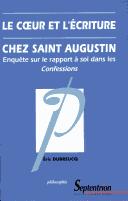
ISBN: 2859397795 9782859397791 2757426745 Year: 2003 Publisher: Villeneuve d'Ascq : Presses Universitaires du Septentrion,
Abstract | Keywords | Export | Availability | Bookmark
 Loading...
Loading...Choose an application
- Reference Manager
- EndNote
- RefWorks (Direct export to RefWorks)
L’homme contemporain a coutume de se concevoir comme une profondeur intérieure. Chacun pense être un monde intérieur et une aventure subjective. Une histoire du sujet révèle cependant que la subjectivité n’est qu’une figure récente de la disposition du rapport à soi. Ainsi, les Confessions d’Augustin, souvent données en prototype des autobiographies apparues à l’âge moderne, témoignent-elles d’une organisation différente du rapport à soi : le sujet ne s’y développe pas comme intériorité subjective, mais suivant des modalités pratiques de constitution et de transformation de soi empruntant leurs règles et leur puissance à l’Écriture. Texte adressé à ses destinataires pour leur prescrire les modalités du travail sur soi au terme duquel le sujet adopte le rapport à soi qui lui permet de voir le jour, les Confessions empruntent la règle de leur écriture aux Écritures : l’exégèse de soi et l’application à soi des Écritures fournissent leur cadre aux exercices spirituels organisant le travail sur soi. Rompent avec les modes d’organisation du rapport à soi de la période précédente - néoplatonisme et manichéisme -, Augustin inaugure une figure singulière du rapport à soi dans laquelle naît un sujet sans subjectivité. La figure chrétienne de l’individu modelée par la pratique des Écritures, fait l’originalité des Confessions et se distingue de la figure moderne, née avec Rousseau, d’une subjectivité cherchant à se retrouver dans l’authenticité de sa singularité.
Cogito --- Ik (Filosofie) --- Moi (Philosophie) --- Self (Philosophy) --- Christianity --- Theology --- Christianisme --- Théologie --- History --- Philosophy --- Histoire --- Philosophie --- Augustine, --- Théologie --- Augustin, --- Augustine --- Contributions in doctrine of self --- Augustin, - saint, évêque d'Hippone. - Confessiones --- philosophie --- écriture --- confessions --- cœur
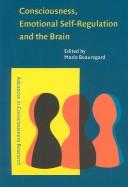
ISSN: 1381589X ISBN: 9027251886 9027251878 9786612255298 9027295867 1282255290 142377230X 9789027251886 9781423772309 9789027295866 1588114589 9781588114587 9781588114594 1588114597 9789027251879 Year: 2004 Volume: v. 54 Publisher: Amsterdam, Netherlands Philadelphia, PA John Benjamins Pub.
Abstract | Keywords | Export | Availability | Bookmark
 Loading...
Loading...Choose an application
- Reference Manager
- EndNote
- RefWorks (Direct export to RefWorks)
During the last decade, the study of emotional self-regulation has blossomed in a variety of sub-disciplines belonging to either psychology (developmental, clinical) or the neurosciences (cognitive and affective). Consciousness, Emotional Self-Regulation and the Brain gives an overview of the current state of this relatively new scientific field. Several areas are examined by some of the leading theorists and researchers in this emerging domain. Most chapters seek to either present theoretical and developmental perspectives about emotional self-regulation (and dysregulation), provide cutting edge information with regard to the neural basis of conscious emotional experience and emotional self-regulation, or expound theoretical models susceptible of explaining how healthy individuals are capable of consciously and voluntarily changing the neural activity underlying emotional processes and states. In addition, a few chapters consider the capacity of human consciousness to volitionally influence the brain's electrical activity or modulate the impact of emotions on the psychoneuroendocrine-immune network. This book will undoubtedly be useful to scholars and graduate students interested in the relationships between self-consciousness, emotion, the brain, and the body. (Series B).
Behavioral neurology --- Bewustzijn --- Brain --- Brein --- Cerebrum --- Cerveau --- Cogito --- Conscience (Psychophysiologie et philosophie) --- Consciousness --- Emoties --- Emotions --- Feelings --- Gevoelens --- Hersenen --- Human emotions --- Mind --- Neuropsychiatrie --- Neuropsychiatry --- Passies --- Passions --- Psychiatrie [Neuro] --- Sentiments --- Émotions --- Émotivité --- Neuropsychiatry. --- Consciousness. --- Brain. --- Emotions.
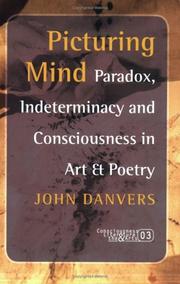
ISBN: 9042018097 9401202109 1423790812 9781423790815 9789042018099 Year: 2006 Volume: 3 Publisher: Amsterdam Rodopi
Abstract | Keywords | Export | Availability | Bookmark
 Loading...
Loading...Choose an application
- Reference Manager
- EndNote
- RefWorks (Direct export to RefWorks)
In this book the author takes an unusual multi-disciplinary approach to debates about contemporary art and poetry, ideas about the mind and its representations, and theories of knowledge and being. Arts practices are considered as enactments of mind and as transformative modes of consciousness. Ideas drawn from poetics, philosophy and consciousness studies are used to illuminate the conceptual and aesthetic frameworks of a diverse array of visual artists. Themes explored include: the interconnectedness of existence; art as a way of interrogating appearances; identity and otherness; art and the self as 'open work'; Buddhist concepts of 'emptiness' and 'suchness'; scepticism, mysticism and the arts; and mind in the landscape. The book contains an important and distinctive visual dimension with photographs and drawings by the author and texts employing unorthodox syntax and layouts that exemplify the themes under discussion. The author hints at a new aesthetics and philosophy of indeterminacy, paradox, uncertainty and discontinuity - a contrarium - in which we negotiate our way through the instabilities and contradictions of contemporary life. Written in a lively and accessible style this volume is of interest to scholars, arts practitioners, teachers and to anyone with an interest in art, poetry, consciousness studies, philosophy and nature. Artists, poets and philosophers discussed, include: Cy Twombly, Helen Chadwick, John Ruskin, Ad Reinhardt, Richard Long, James Turrell, Anish Kapoor, Ian Hamilton Finlay, Agnes Martin, Land Art, Arte Povera, Minimalism, Charles Olson, Kenneth White, Robin Blaser, Fred Wah, Gary Snyder, RS Thomas, Alice Oswald, John Cage, Jorge Luis Borges, Guy Davenport, Kenneth Rexroth, Heidegger, Marjorie Perloff, Thomas McEvilley, Merleau-Ponty, Spinoza, Wittgenstein, Roland Barthes, Umberto Eco, David Abram, Thomas Merton, Pyrrho & Nagarjuna.
Bewustzijn --- Cogito --- Conscience (Psychophysiologie et philosophie) --- Consciousness --- Dichtkunst --- Poetry --- Poésie --- Poëzie --- Art --- Aesthetics --- Literature --- Philosophy --- Philosophy of mind. --- Mind, Philosophy of --- Mind, Theory of --- Theory of mind --- Cognitive science --- Metaphysics --- Philosophical anthropology --- Literature and philosophy --- Philosophy and literature --- Beautiful, The --- Beauty --- Art and philosophy --- Philosophy. --- Theory --- Analysis, interpretation, appreciation --- Knowledge, Theory of. --- Consciousness.
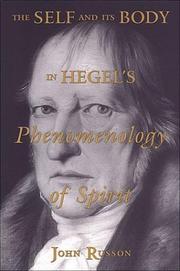
ISBN: 0802084826 0802009190 9786612008511 128200851X 1442682345 9781442682344 9780802084828 Year: 1997 Volume: *7 Publisher: Toronto
Abstract | Keywords | Export | Availability | Bookmark
 Loading...
Loading...Choose an application
- Reference Manager
- EndNote
- RefWorks (Direct export to RefWorks)
A major criticism of Hegel's philosophy is that it fails to comprehend the experience of the body. In this book, John Russon shows that there is in fact a philosophy of embodiment implicit in Hegel's Phenomenology of Spirit. Russon argues that Hegel has not only taken account of the body, but has done so in a way that integrates both modern work on embodiment and the approach to the body found in ancient Greek philosophy.Although Russon approaches Hegel's Phenomenology from a contemporary standpoint, he places both this standpoint and Hegel's work within a classical tradition. Using the Aristotelian terms of 'nature' and 'habit,' Russon refers to the classical distinction between biological nature and a cultural 'second nature.' It is this second nature that constitutes, in Russon's reading of Hegel, the true embodiment of human intersubjectivity. The development of spirit, as mapped out by Hegel, is interpreted here as a process by which the self establishes for itself an embodiment in a set of social and political institutions in which it can recognize and satisfy its rational needs. Russon concludes by arguing that self-expression and self-interpretation are the ultimate needs of the human spirit, and that it is the degree to which these needs are satisfied that is the ultimate measure of the adequacy of the institutions that embody human life.This link with classicism - in itself a serious contribution to the history of philosophy -provides an excellent point of access into the Hegelian system. Russon's work, which will prove interesting reading for any Hegel scholar, provides a solid and reliable introduction to the study of Hegel.
Body [Human ] (Philosophy) --- Body [Human ]--Philosophy --- Cogito --- Corps humain (Philosophie) --- Corps humain--Philosophie --- Human body (Philosophy) --- Ik (Filosofie) --- Lichaam [Menselijk ] (Filosofie) --- Lichaam [Menselijk ]--Filosofie --- Menselijk lichaam (Filosofie) --- Moi (Philosophie) --- Self (Philosophy) --- Body, Human (Philosophy) --- Hegel, Georg Wilhelm Friedrich, --- Philosophy --- Hegel, Georg Wilhelm Friedrich --- Phänomenologie des Geistes (Hegel, Georg Wilhelm Friedrich) --- Phenomenology (Hegel, Georg Wilhelm Friedrich) --- Phenomenology of mind (Hegel, Georg Wilhelm Friedrich)
Book
ISBN: 022641907X Year: 2015 Publisher: Chicago : University of Chicago Press,
Abstract | Keywords | Export | Availability | Bookmark
 Loading...
Loading...Choose an application
- Reference Manager
- EndNote
- RefWorks (Direct export to RefWorks)
Although Martin Heidegger is nearly as notorious as Friedrich Nietzsche for embracing the death of God, the philosopher himself acknowledged that Christianity accompanied him at every stage of his career. In Heidegger's Confessions, Ryan Coyne isolates a crucially important player in this story: Saint Augustine. Uncovering the significance of Saint Augustine in Heidegger's philosophy, he details the complex and conflicted ways in which Heidegger paradoxically sought to define himself against the Christian tradition while at the same time making use of its resources. Coyne first examines the role of Augustine in Heidegger's early period and the development of his magnum opus, Being and Time. He then goes on to show that Heidegger owed an abiding debt to Augustine even following his own rise as a secular philosopher, tracing his early encounters with theological texts through to his late thoughts and writings. Bringing a fresh and unexpected perspective to bear on Heidegger's profoundly influential critique of modern metaphysics, Coyne traces a larger lineage between religious and theological discourse and continental philosophy.
Philosophy and religion. --- Heidegger, Martin, --- Augustine, --- heidegger, philosophy, christianity, god, divinity, religion, saint augustine, being and time, secularism, theology, metaphysics, continental, bishop of hippo, temporality, difference, existentialism, beuron lecture, conscience, truth, justice, temptation, sin, self, reflection, understanding, plato, restraint, reason, questioning, phenomenology, ontology, paul, nothingness, morality, mysticism, kant, husserl, joy, despair, happiness, virtue, perfection, nonfiction, hegel, grace, guilt, fear, ego, descartes, cogito ergo sum, anxiety, confession.
Book
ISBN: 9789089313584 Year: 2013 Publisher: Gent Borgerhoff & Lamberigts
Abstract | Keywords | Export | Availability | Bookmark
 Loading...
Loading...Choose an application
- Reference Manager
- EndNote
- RefWorks (Direct export to RefWorks)
De Vlaamse neuroloog Steven Laureys is een wereldautoriteit in de kennis van hoe ons brein werkt. Hij is kandidaat-Nobelprijswinnaar voor zijn baanbrekend onderzoek naar het bewustzijn. In dit boek beantwoordt hij vele wonderlijke vragen over de krachten en de grenzen van ons briljante brein. Wat IS dat, bewustzijn? Hoe werken onze hersenen en gaan we ooit gedachten kunnen lezen ? Hoe kunnen we weten of comapatiënten nog bewust zijn en hoe kunnen we met hen communiceren ? Wat is de bijna-dood-ervaring ? Wat is hersendood, wat kunnen we met hypnose, welke delen van de hersenen dienen waarvoor ?Bron : http:/www.borgerhoff-lamberigts.be
Bewustzijn --- Cogito --- Conscience (Psychophysiologie et philosophie) --- Consciousness --- Neural sciences --- Neurological sciences --- Neuroscience --- Neurosciences --- Neurowetenschappen --- Sciences [Neuro] --- Sciences neurologiques --- Wetenschappen [Neuro] --- BPB1305 --- Anatomie --- #KVHB:Hersenen --- Hersenen (cerebrum) --- Hersenen --- Neurologie --- Bewustzijn. --- Hersenen. --- hypnose --- bewustzijnsstoornissen --- bijnadoodervaringen --- neurologie --- bewustzijn --- Neuropathology --- coma --- hersenen --- Physiology of nerves and sense organs --- Cognitive psychology --- Brain --- Physiology --- анатомия --- anatomy --- anatomija --- anatómia --- анатомија --- anatoomia --- ανατομία --- anatomi --- anatomía --- anatomia --- anatomie --- anatomia patologica --- anatomia descrittiva --- анатомия --- anatómia --- анатомија --- ανατομία --- anatomía --- Verpleegkunde --- anatamaíocht
Book
ISBN: 128306958X 9786613069580 1400838711 9781400838714 9780691148724 0691148724 9780691149271 0691149275 6613069582 Year: 2011 Publisher: Princeton, NJ
Abstract | Keywords | Export | Availability | Bookmark
 Loading...
Loading...Choose an application
- Reference Manager
- EndNote
- RefWorks (Direct export to RefWorks)
We think of the Enlightenment as an era dominated by ideas of progress, production, and industry--not an era that favored the lax and indolent individual. But was the Enlightenment only about the unceasing improvement of self and society? The Pursuit of Laziness examines moral, political, and economic treatises of the period, and reveals that crucial eighteenth-century texts did find value in idleness and nonproductivity. Fleshing out Enlightenment thinking in the works of Denis Diderot, Joseph Joubert, Pierre de Marivaux, Jean-Jacques Rousseau, and Jean-Siméon Chardin, this book exp
Laziness. --- Enlightenment --- Indolence --- Sloth --- Deadly sins --- Personality --- Bonnet de nuit. --- Bulles de savon. --- Cartesian thought. --- Denis Diderot. --- Diderot. --- Enlightenment thinking. --- Enlightenment. --- Georges-Jacques Danton. --- Jean-Jacques Rousseau. --- Jean-Simon Chardin. --- Joseph Joubert. --- Louis-Sbastien Mercier. --- Michel Foucault. --- Pierre Carlet de Marivaux. --- Pierre de Marivaux. --- Rameau's Nephew. --- alternative subjectivation. --- authority. --- bourgeois. --- contemplation. --- domestic interiors. --- dsoeuvrement. --- efficiency. --- effort. --- eighteenth century. --- functionality. --- idleness. --- idler. --- industrialization. --- journalist. --- labor. --- laziness. --- leisure. --- modernity. --- moralist. --- nonproductivity. --- philosopher. --- philosophical writings. --- philosophy. --- pillow. --- political philosopher. --- politics. --- productivity. --- sensory cogito. --- solid reality. --- subjectivity. --- subtlely. --- utopia. --- writing.
| Listing 1 - 10 of 12 | << page >> |
Sort by
|

 Search
Search Feedback
Feedback About UniCat
About UniCat  Help
Help News
News